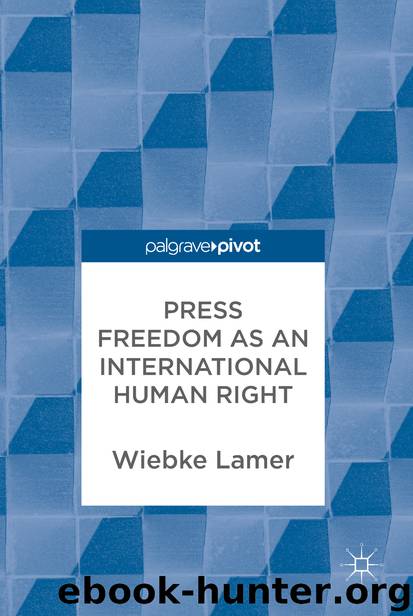Press Freedom as an International Human Right by Wiebke Lamer

Author:Wiebke Lamer
Language: eng
Format: epub
Publisher: Springer International Publishing, Cham
4.4.1 The Drafting of the Universal Declaration of Human Rights and the Early Days of the UN Human Rights Agenda
Press freedom entered the international debate early on. What is more, deliberations always followed the same pattern. The League of Nations portrayed the press as a tool to usher in peace and a precondition for material disarmament (Hamelink 1994, 18). A few years later, in 1932, the League focused on the press again, but this time it was during a conference to discuss the problem of inaccurate news, followed by another meeting in 1933 on the right to correct false information (Hamelink 1994, 19). The emerging pattern was that the free flow of information ideal was introduced by the West, and then followed up by opposition from the Soviets, highlighting the many alleged dangers of a free press and requesting regulation.
During the initial stages of establishing the UN human rights framework, the press garnered a fair amount of attention, too. Following the experiences and consequences of World War II and its widespread propaganda campaigns, the issue of freedom of information was a priority for those tasked with drafting an international human rights regime. Members of the Commission on Human Rights pointed out that “it had often happened that newspapers and news agencies had poisoned the mind of the public by twisting the facts” (ECOSOC 1946, 10). They felt that “in the future, measures be considered against deliberate and systematic distortion of the truth” (ECOSOC 1946, 10). To do so, the Sub-Commission on Freedom of Information and of the Press was created. The Western delegates encouraged it “to get to work immediately because it was formulating one of the basic human freedoms” (ECOSOC 1947b). But the official mandate of the Sub-Commission was “to examine what rights, obligations, and practices should be included in the concept of freedom of information” (ECOSOC 1946, 11). It seems that enthusiasm for advocating an unfettered press was not just limited on the side of the Soviets.
Press freedom was a major talking point during the early stages of the drafting of the International Bill of Rights. But the debate occurred within the framework of discussing the concept of freedom of information and the accepted notion that the press needed restrictions, since its role came with certain responsibilities. Like the discussions of press freedom at the UN today, the drafting process of the Universal Declaration of Human Rights also suggests that no clear distinctions were drawn between press freedom and freedom of information. The former was simply regarded as being part of the larger idea of the free flow of information.
The first draft of the Universal Declaration of Human Rights was written by the Canadian John Humphrey, who served as Director of the UN Division of Human Rights. The Humphrey draft was based on numerous other drafts written by interest groups, NGOs, organizations of lawyers, and the like. At least one of these drafts, that of the Inter-American Juridical Committee, includes the right to a free press specifically. In
Download
This site does not store any files on its server. We only index and link to content provided by other sites. Please contact the content providers to delete copyright contents if any and email us, we'll remove relevant links or contents immediately.
The Secret History by Donna Tartt(19048)
The Social Justice Warrior Handbook by Lisa De Pasquale(12187)
Thirteen Reasons Why by Jay Asher(8893)
This Is How You Lose Her by Junot Diaz(6877)
Weapons of Math Destruction by Cathy O'Neil(6264)
Zero to One by Peter Thiel(5786)
Beartown by Fredrik Backman(5737)
The Myth of the Strong Leader by Archie Brown(5498)
The Fire Next Time by James Baldwin(5431)
How Democracies Die by Steven Levitsky & Daniel Ziblatt(5213)
Promise Me, Dad by Joe Biden(5141)
Stone's Rules by Roger Stone(5081)
A Higher Loyalty: Truth, Lies, and Leadership by James Comey(4951)
100 Deadly Skills by Clint Emerson(4920)
Rise and Kill First by Ronen Bergman(4778)
Secrecy World by Jake Bernstein(4740)
The David Icke Guide to the Global Conspiracy (and how to end it) by David Icke(4700)
The Farm by Tom Rob Smith(4502)
The Doomsday Machine by Daniel Ellsberg(4484)
